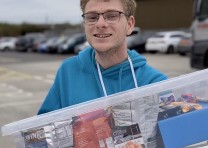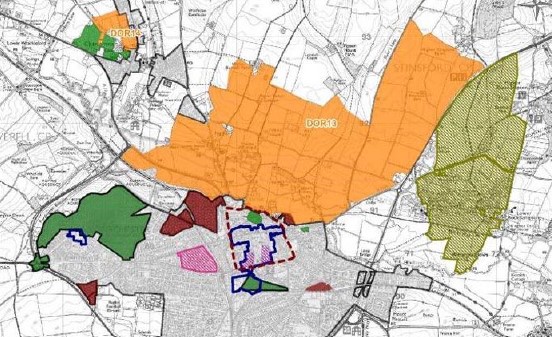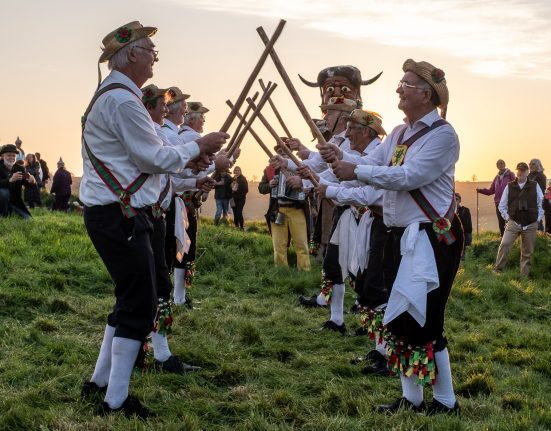Peter Fry, a lifelong member of Came Down Golf Club, is proud of the club’s vital role in the establishment of the Ryder Cup.
Peter said: “Sam Ryder certainly wouldn’t have been pleased to see the raucous goings-on at the weekend.
“After the battle of Brookline in 1999, his grand-daughter said how disappointed he would have been when Ben Crenshaw’s US team started celebrating before Europe had even the chance to putt to square the hole.
“Ryder spoke of his wish that the cup could help to influence the best things in humanity. Frankly I think he would be appalled by the abuse and tactics by some of the crowds at Bethpage. He wouldn’t have even been playing golf on the Sabbath in those days and it was very much a game for gentlemen.
“Times have changed so much.”


Although the origins of the Ryder Cup are somewhat disputed, there is plenty of proof to back up Came Down’s historic role in its conception.
Peter said: “Samuel Ryder was a successful and enterprising businessman, and he spent many happy days in Weymouth with his family. His wife and daughters would enjoy the beach, while he would spend his time with the legendary Whitcombe brothers at the golf club.




Up until 1924, it was known as the Weymouth, Dorchester and County Golf Club, which was quite possibly the longest golf club name anywhere in the world before it was renamed as Came Down Golf Club.
“The PGA tend to leave Came Down and Ryder’s home golf club of Verulam at St Albans out of the story, which annoys me. I’ve always based my research on proper evidence, which shows our club played a really important role. There was an international match in 1926 at Wentworth between American and British players but I think the idea was formed by Ryder on the fairways at Came Down long before then.
“I don’t think the Ryder Cup was born in a single moment. It was clearly not an overnight snap decision.
“Walt Matthews, who caddied for Ryder and went on to become an assistant professional at Came Down and later a Life Member of the PGA, overheard conversations about his idea for a golf match of some kind between the best players from Great Britain and America.
“Ryder’s eldest daughter, Marjorie Claisen, has written of her father’s discussions with Ernest Whitcombe at Came Down too. He asked Ernest about whether he participated in tournaments and Ernest said that he couldn’t afford to take time off work. He was poorly paid in any case and he wouldn’t be paid for any time off. “Ryder saw a real disparity in how the subsidised American golfers could afford to take part in tournaments, compared with their British counterparts.”
Along with many other books, Peter has written about the Whitcombe brothers – Ernest, Charles and Reg – who have their own place in golfing history, and who played at Came Down for many years. Peter said: “Their mother was the stewardess at the club, and the oldest brother, Ernest, established himself as the club professional, with Charles and Reg as assistants, and they were all terrific golfers.
“Occasionally Ryder brought his talented coach Abe Mitchell to play with the Whitcombes and was impressed at how good the brothers were.”
Despite lacking the financial backing of their American counterparts, the Whitcombes became prominent golfers.
Peter said: “Reg was victorious in The Open of 1938 at Royal St George’s, while Ernest was beaten by a single stroke by Walter Hagen in 1924.
“Charles enjoyed a successful career as well with no fewer than six Top 10 finishes in The Open, with his best result a third place in 1935.
“They also played regularly in the Ryder Cup, with 11 appearances between them, and Charles was selected four times to be the team captain. All three brothers played in the 1935 Ryder Cup match in America. One must bear in mind that in those days it was the Top 10 golfers who qualified to make the team with no wild card picks, so all three Whitcombes would have been in the Top 10 at that time.
“Nothing has ever come close to the Whitcombes’ record as a golfing family and it’s wonderful to think that they played the same course as we do today.
“In time, the Whitcombes gravitated away from Came Down. Ernest moved to Meyrick Park and Reg left for Parkstone, both persuaded by higher pay.
“Eventually Charles set up at Crews Hill Golf Club in North London for 25 years before retiring back in Dorset to a cottage at Moreton, and was the guest of honour for the opening ceremony of the new clubhouse in 1964.”
Peter still plays golf and has travelled to several Ryder Cup matches.


He is hopeful that golf will not be lost to a new generation. He said: “I joined Came Down when I was 14 and am the longest member with an active handicap.
“I’m not as good as I used to be, but I still enjoy it immensely.
“I was watching the highlights of the Ryder Cup on BBC, which were on at midnight and think it’s such a shame that fewer people have access to the live coverage. I am concerned that youngsters from the poorer sections of society are unable to access the top sports stars on TV.
“With the television coverage being on subscription channels, a lot fewer people are being inspired.”
n Peter is available to give talks on a variety of topics, including Samuel Ryder, the Ryder Cup and The Whitcombe Brothers, with all proceeds passed to the charity Action Medical Research, a cause close to Peter’s heart.
Please contact Peter for details on 07388 202657 or flydrive@ btinternet.com








